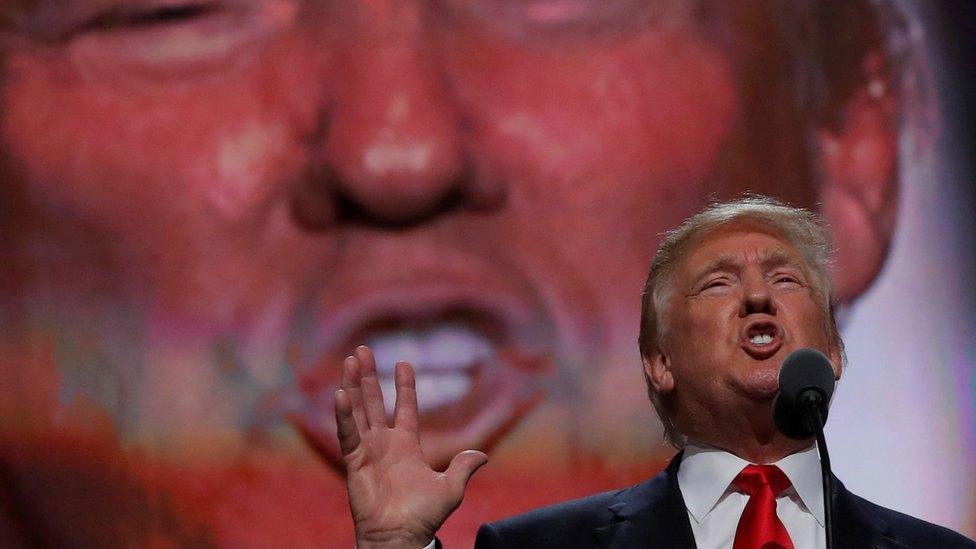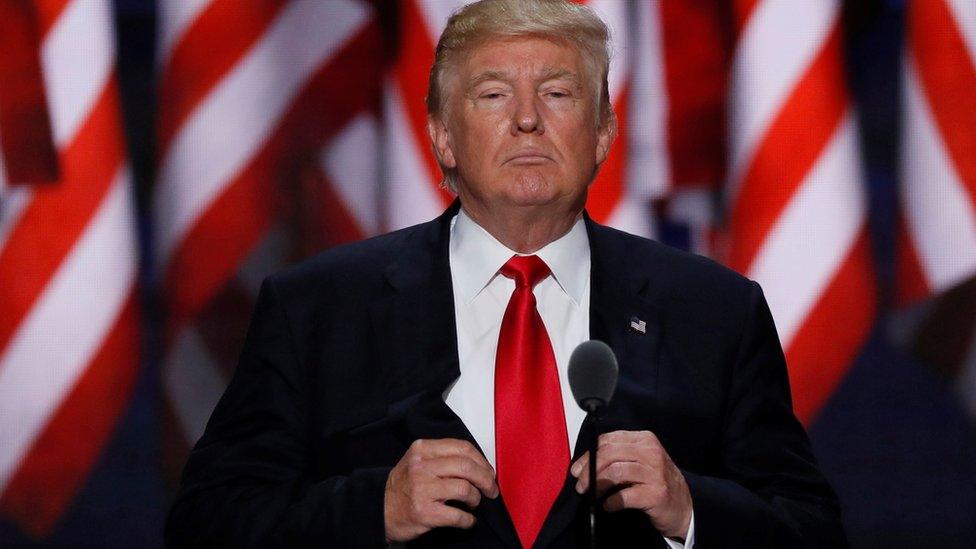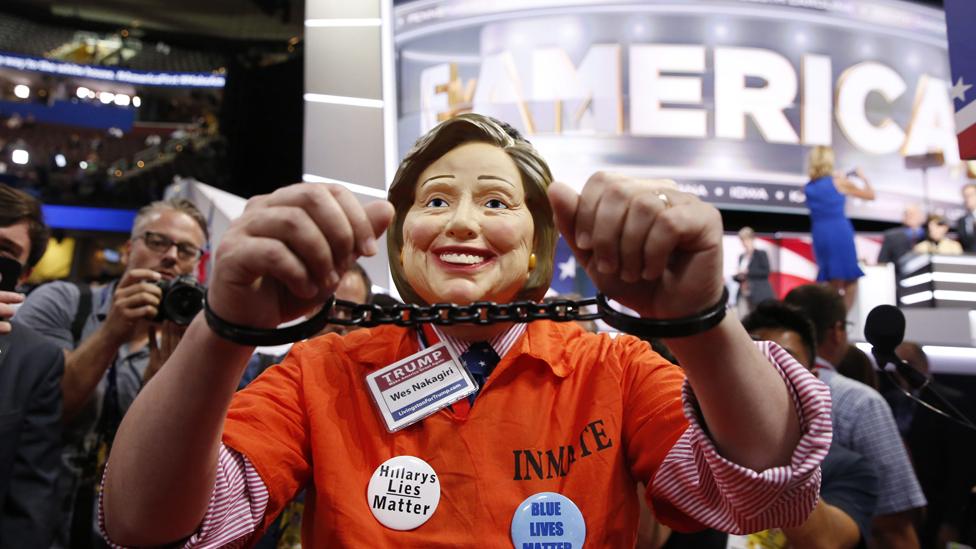Five Trumps in one nomination speech
- Published
Trump paints a dark picture of America
Nearly 50 years ago Richard Nixon launched his successful election under the banner of restoring "law and order" to a nation wrecked by violent protests and social upheaval.
Now, another Republican nominee, Donald Trump, is going to run under that same banner.
His speech began with darkness and ended - more than an hour later and well out of prime time - with glimmers of hope.
Mr Trump painted a picture of a nation let down by its leaders, who have failed to "put America first" in policies both foreign and domestic.
The Republican nominee had an answer, however. "I am your voice," he shouted to thunderous applause and chants. Donald Trump is the solution.
The goal for Mr Trump on Thursday was to reshape the image Americans have of him. Polls show he has record high negative numbers for a modern major-party presidential candidate. His presidential acceptance speech tried to replace this perception with one that can garner a winning electoral majority.
Here's how Mr Trump tried to do it, in five personas he wants to inhabit.
The law-enforcer

"We will be a country of generosity and warmth. But we will also be a country of law and order."
Mr Trump started his speech painting a dark portrait of a nation under siege. He cited an array of statistics that he asserted showed crime out of control. Then he recounted the recent episodes of police shootings and anecdotes about Americans killed by undocumented immigrants.
As NBC's Mark Murray, external points out, however, the larger statistics paint a different picture. The violent crime rate at the beginning of the Obama administration was 431 incidents per 100,000 Americans. It has dropped to 351 per 100,000.
It's a common tactic for the party out of political power during a presidential race to highlight the negative, and Mr Trump certainly followed this strategy.
"The first task for our new administration will be to liberate our citizens from the crime and terrorism and lawlessness that threatens their communities," he said.
His solutions included his trademark calls for a border wall and a ban on Muslim immigrants that was rebranded as a temporary suspension of immigration from "any nation that has been compromised by terrorism".
The America Mr Trump sees is not in good shape - and while the remedy Mr Trump is offering has been controversial, he used his speech to insist that it is the only cure.

The outsider
"These reforms that I will outline tonight will be opposed by some of our nation's most powerful special interests - that is because these interests have rigged our political and economic system for their exclusive benefit."
Mr Trump has run an us-against-them campaign from the moment he descended the golden escalator at his launch, and that attitude pervaded his speech - in its content and his sharp, shouted delivery. It's Mr Trump against the world, his style seemed to imply, but it is a fight he's going to win.
"All of the people telling you that you can't have the country you want, are the same people telling you that I wouldn't be standing here tonight," Mr Trump said to cheers.
If the state of the nation is bad, Mr Trump argued, it's because those currently in office - the establishment he has rocketed to power condemning - has made it that way.
This "rigged system" rhetoric is also a favourite theme of that insurgent candidate on the left, Bernie Sanders. Mr Trump made a direct appeal to the Vermont senator's voters on the issue he said is most important to them - trade.
He said he would establish a "new, fair trade policy that protects our jobs and stands up to countries that cheat".
Open-trade policy has been a staple of elites on both the left and the right, and Mr Trump will attack it from all directions.
If he is going to be elected president, he will have to convince voters - not just from the right but also the disaffected left - that the political experience he lacks is his strength. If the system is broken, only someone totally removed from the system can fix it.

The truth-teller?

"I will tell you the plain facts that have been edited out of your nightly news and your morning newspaper"
Part of Mr Trump's success has been his willingness to pull back the curtain on US politics and let Americans in on what he sees as the joke. Trump supporters almost universally point to his willingness to say controversial things - to "not be politically correct", as he puts it - as a sign that his promises to improve their lives aren't empty.
Several times during his speech, Mr Trump attempted to pursue this tack again.
"If you want to hear the corporate spin, the carefully crafted lies, and the media myths the Democrats are holding their convention next week," he said to laughter.
He assured the viewers that he was going to tell the truth "and nothing else".
It's the kind of bluntness that is difficult for smoother, more polished politicians to pull off. But if there's one thing Mr Trump isn't, it's smooth and polished.
Then there was the moment toward the end of Mr Trump's speech where, in thanking evangelical conservatives for their support, he quipped that he wasn't sure he deserved it. The crowd laughed - but not because his off-script comment was a joke, but because it was likely true.
It's the kind of candour that has made Mr Trump a unique phenomenon in US politics.

The uniter
"Every action I take, I will ask myself: does this make life better for young Americans in Baltimore, Chicago, Detroit, Ferguson who have as much of a right to live out their dreams as any other child America?"
Despite all the darkness of the opening and the rawness of Mr Trump's tone, his speech made a determined effort to expand his appeal beyond the angry white, working-class voters who make up the core of his support. He reached out to blacks - talking about their high levels of unemployment and poverty. He said the Obama administration has failed the inner cities on education, jobs and crime.
If Mr Trump's law-and-order pitch is to be successful, it can't only be to his base - and this was a speech that acknowledged this.
Can Trump win with white voters only?
In addition, Mr Trump once again went off-script when he spoke about protecting gay Americans from "violence and oppression of a hateful foreign ideology".
When the crowd cheered, he paused.
"As a Republican, it is so nice to be hearing you cheering for what I just said," he noted.
It was a decided change in tone from a Republican nominee - and a stark contrast even from the platform his own party adopted just days earlier.

The un-Clinton
"This is the legacy of Hillary Clinton: death, destruction and weakness."

The 2016 Republican convention has been dominated by anti-Clinton vitriol. The impromptu chant day after day when a speaker condemned their Democratic opponent was "lock her up!"
They did so again during Mr Trump's speech, but he tried to cool the crowd. "Let's defeat her in November," he said.
Mr Trump's speech did give plenty of anti-Clinton red meat to the audience, however. There was the obligatory Benghazi reference when he spoke about Libya. He cited the former secretary of state's email-server controversies and the FBI report that, while not recommending criminal charges, was very critical.
"Her single greatest accomplishment may be committing such an egregious crime and getting away with it," Mr Trump said.
Once again, Mr Trump laid all the turmoil in the Middle East at Mrs Clinton's feet. Libya, Egypt, Iran, Syria, Iraq and the rise of the so-called Islamic state were the presumptive Democratic nominee's doing.
He blasted her on trade and immigration, taxes and healthcare.
In a week, Mrs Clinton will have her opportunity to answer - and then the general election campaign will have started in earnest.